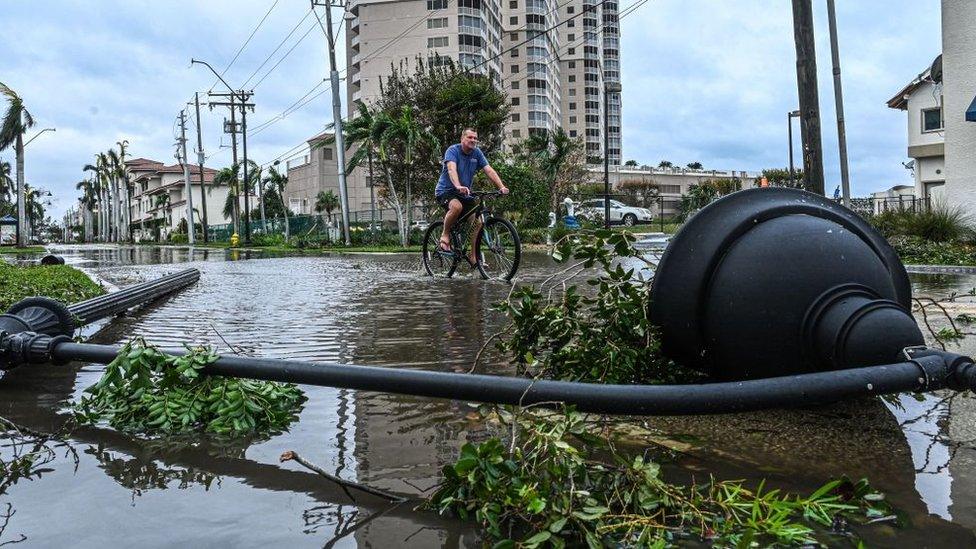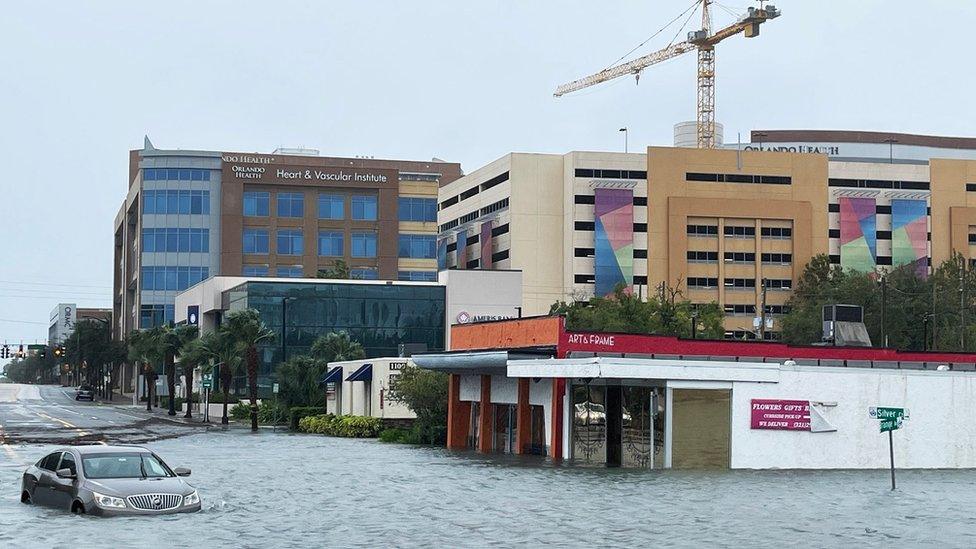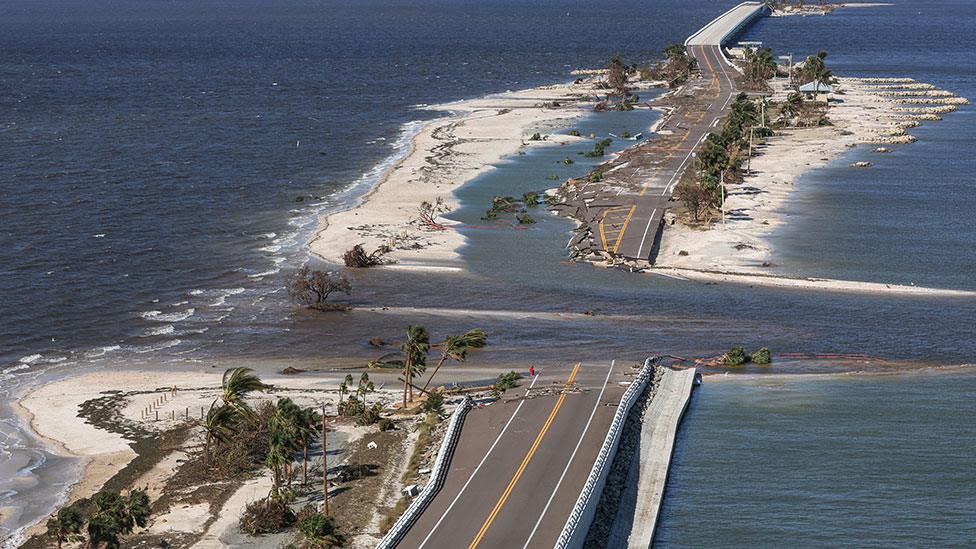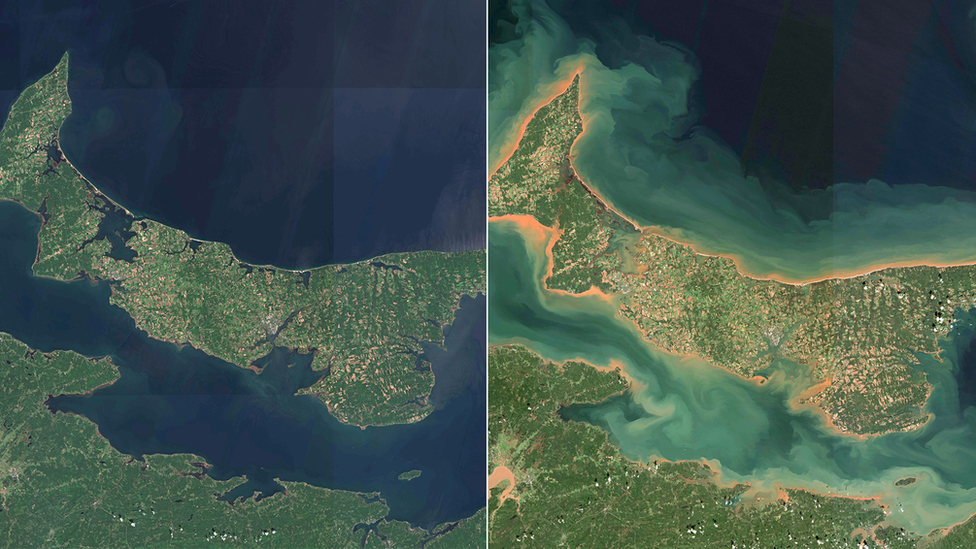Hurricane Ian: Florida governor warns of 'historic' destruction
- Published

Fort Myers was among the hardest-hit cities in Florida
Florida Governor Ron DeSantis warned Hurricane Ian would leave historic devastation, as the storm batters the state with catastrophic wind and rain.
Ian, which has left people trapped in their homes, is expected to set flood records and may be one of the worst storms ever to strike the state.
It continued to wreak havoc as it moved east over Florida on Thursday.
One person is confirmed to have died in the state and some 2.7 million people are without power.
President Joe Biden has declared the storm a major disaster - triggering access to federal funds and disaster relief.
Hurricane Ian: Billions in property damage
"This could be the deadliest hurricane in Florida's history," he said on Thursday afternoon. "The numbers are still unclear, but we're hearing early reports of what may be substantial loss of life."
Florida's Mr DeSantis said some 30,000 first responders were on their way to assist recovery efforts, though some areas of the state remain inaccessible.
"The amount of water that's been rising, and will likely continue to rise today even as the storm is passing, is basically a 500-year flooding event," he said.
LIVE: Follow updates here
VISUAL GUIDE: Maps and images show destruction
Erik Salna, associate director of the International Hurricane Research Center, told the BBC the damage from Ian would likely leave parts of of the state unrecognisable.
"From what we're seeing now, Fort Myers beach, Bonita Beach, Naples - these places are going to look dramatically different when this is finally done," Mr Salna said. "We just hope that the people who were asked to evacuate did."
Ian has continued to inundate communities with severe rainfall as it moves east to west over the Florida peninsula.
In Port Charlotte, a community in south-western Florida that was battered by the storm, Tom, 48, and his 66-year-old, wheelchair-bound mother Kathy survived Hurricane Ian for nearly 12 hours after the roof blew off part of their home.
"We were in the bathroom and could feel the wall shaking," Tom told the BBC.
The pair had been planning a move to Colorado, and after a traumatic and devastating night, have decided to leave immediately.
For Cathy, who has lived in Florida for the past 18 years, the prospect of leaving the state is heartbreaking. But there is little left to keep her here.
"The town is destroyed," she said, along with her home of the past six years.

Orlando, like much of Florida, has been inundated with rainfall
On Thursday morning, traffic crawled along a major road that slices the length of the Florida peninsula, with cars heading back towards areas hit hardest by Ian such as Fort Myers and surrounding Lee County.
Almost all of this ocean-side county was without power as of 10:30 local time (15:00 GMT), authorities said, and search and rescue efforts were active.
"I spend a lot of time studying hurricane damage, and I'm thinking it will be $100bn (£90bn) in damage and several hundred fatalities," said Hugh Willoughby, a meteorology professor at Florida International University. "I hope I'm wrong."
Basic rebuilding and construction efforts will take until the new year, he said, though a full recovery to the area will take "several years".
By Thursday afternoon, Ian had emerged over the Atlantic as it continues its journey west towards North and South Carolina. The US National Weather Service said it expects Ian to intensify into a hurricane once again.
The warm water of the Gulf Stream - a fast-moving ocean current that travels north along the east cost of Florida - makes for ideal conditions for a hurricane, Professor Willoughby said.
"Hurricanes derive their energy from warm ocean water and the Gulf Stream is sort of the warmest ocean water around," he told the BBC.
But while the Carolinas are expected to be hit, they will likely face a weaker storm than Cuba and Florida have endured. "Unless we're very, very unlucky it won't be as intense as in Florida," he said.



How have you been affected by Hurricane Ian? Share your story by emailing haveyoursay@bbc.co.uk, external.
Please include a contact number if you are willing to speak to a BBC journalist. You can also get in touch in the following ways:
WhatsApp: +44 7756 165803
Tweet: @BBC_HaveYourSay, external
Please read our terms & conditions and privacy policy
If you are reading this page and can't see the form you will need to visit the mobile version of the BBC website to submit your question or comment or you can email us at HaveYourSay@bbc.co.uk, external. Please include your name, age and location with any submission.
- Published30 September 2022

- Published28 September 2022

- Published28 September 2022
